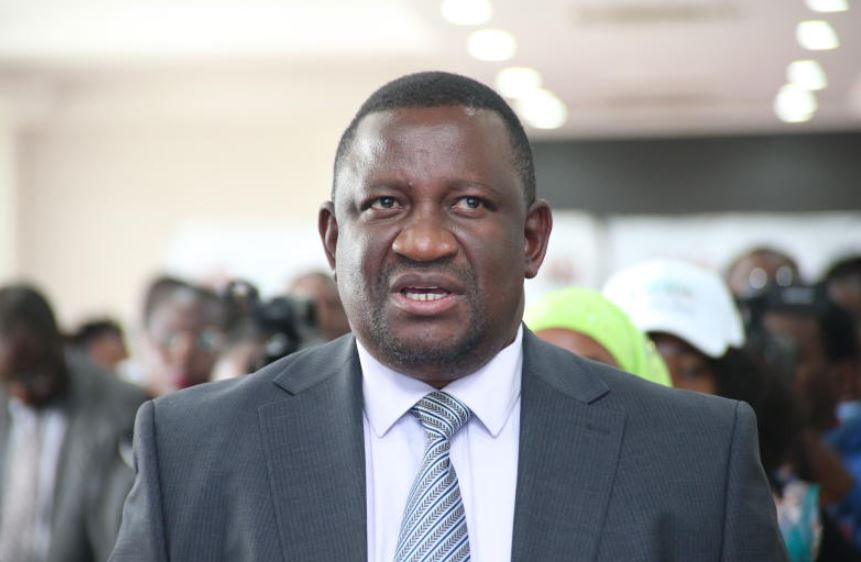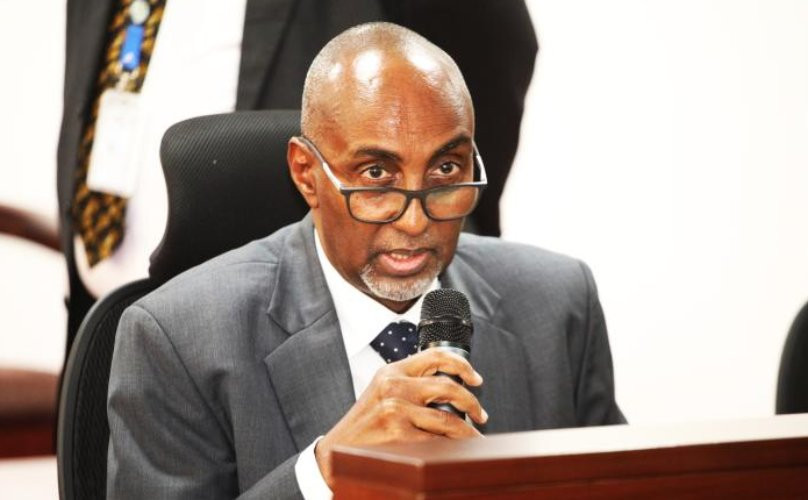Kenya Television Network (KTN) and Nation Television (NTV) were switched off on Wednesday following a directive by the Communication Authority of Kenya (CA).
In a move seen as gagging the media from telling Kenyans about events that unfolded during the Wednesday Gen Z demonstrations to commemorate last year’s Finance Bill, David Mugonyi, the CA director, ordered the stations shut.
He cited Articles 33(2) and 34(1) of the Constitution alongside Section 461 of the Kenya Information and Communications Act (KICA), 1998.
Nevertheless, lawyer Kibe Mungai in his interview with The Standard observed that Mugonyi quoted a non-existent section of the law and ignored a judgment by the High Court that stripped the agency of its powers to regulate media content.
“A non-existent provision has no legal effect that proves impunity. If you read the letter, no offence has been quoted. Since it is lawful to do live broadcasts, that means if one has to shut live broadcast, one has to have a justification,” said Kibe.
According to Kibe, the media’s place in democracy is anchored on the fact that it needs to tell Kenyans what is happening.
According to him, the basic way that Kenyans can express themselves is through the media, while the fourth estate has a role in exposing excesses done by the government and its agencies.
“It is important to note that there are several decisions on banning live broadcasts. It makes one wonder what business wants to engage in, as it wants things in the dark. Some goons are working in tandem with the police; it is worrisome and goes on to confirm that Gen-Zs are right in their demands,” he said.
The 1998 law has 103 Sections. It was replaced by the Kenya Information and Communications (Amendment) Act, 2013.
“This is to direct all television and radio stations to stop any live coverage forthwith. Failure to abide by this directive will result in regulatory action as stipulated in the Kenya Information and Communications Act (KICA), 1998,” Mugonyi’s demand read in part.
The Kenya Editors Guild (KEG), through its president Zubeida Kananu, condemned the move, saying that it not only violated the freedom of the media, freedom of expression, and right of Kenyans to receive information.
KEG demanded that CA desist from issuing the directive, terming it illegal. According to Kananu, silencing the voice that tells the story was a greater crisis than the protests.
“This directive flies in the face of the 2023 High Court ruling in Kenya Editors’ Guild & Others v Communications Authority & Others, where the court restrained CA from interfering with live media broadcasts. The judgment reinforced that no government agency may impose prior restraint on the press. By ignoring this ruling, CA is actively undermining judicial authority and reopening the door to unconstitutional state censorship,” said Kananu.
Stay informed. Subscribe to our newsletter
Former Chief Justice Willy Mutunga questioned CA’s rationale and reasoning behind the demand and subsequent switch off. He said there was no evidence to show that the laws cited were violated.
“Where is the evidence that those provisions have been violated? What about Article 37 and the robust jurisprudence on how the Constitution is to be interpreted? The CAK thinks of the Constitution as a fascist and interpretative approach,” he said.
The Law Society of Kenya, Police Reforms Working Group-Kenya and the Kenya Medical Association called out CA, saying that it violated Justice John Chigiti’s orders, which stripped it power to dictate what the media houses should show Kenyans.
“We remind the CA that the media acts as a watchdog, documenting the actions of both protesters and law enforcement. Live broadcasts can deter excessive force and human rights violations by ensuring that actions are witnessed and recorded, thus fostering accountability. Shutting down live broadcasts of protests and the internet under the guise of preventing propaganda for war or incitement to violence is a dangerous precedent. It risks creating an information blackout that will only exacerbate an already fragile public order situation,” the statement sent after the notice reads in part.
The statement by the three organisations urged media houses to keep their cameras on police brutality and compliance with court orders requiring them to be either in uniforms, vehicles with number plates, or not concealing their faces.
“We urge the Communications Authority to immediately withdraw this directive and uphold its mandate to protect media freedom and the public’s right to access information. We place the CA and Chief Executive Officer on notice that we will pursue both institutional and individual legal redress should this action not be reversed by 4 pm today,” the statement continued.
In his judgment, Justice Chigiti ruled that Regulation 19(a), (b), (c), and (d) of the Kenya Information and Communications (Broadcasting) Regulations, 2009 are unconstitutional for limiting freedom of expression, media, and information.
The judge agreed with Katiba Institute that the regulations were vague and gave CA unfettered powers to censure or close down a TV or a radio station.
He also ordered CA to review the Programming Code for Broadcasting Services in Kenya, noting that the code had already expired.
“A declaration is hereby issued that regulations 19(a), (b), (c), and (d) of the Kenya Information and Communications (Broadcasting) Regulations, 2009 unconstitutionally limits the freedom of expression, media, and information in vague and overbroad terms contrary to Articles 33, 34, and 35 of the Constitution,” ruled Justice Chigiti. In March this year, Citizen TV, NTV, K24, KBC, TV47, and Ebru TV broadcast live protests by the opposition, Azimio la Umoja One Kenya.
Following the coverage, former CA director general Ezra Chiloba issued notices to the broadcasters to take immediate remedial action.
The notices required the media houses not to broadcast live scenes that CA deemed to be against peace and cohesion.
In the notice, Chiloba warned that those who would defy were liable for sanctions, including revocation of licenses.
In the case, Katiba’s lawyer Dudley Ochiel argued that none of the six media houses was heard on the decision to censure them.
Ochiel told the court that CA could not provide any supporting evidence to show that the board met before a decision was made.
According to him, the notices issued on March 22 this year amounted to illegal censorship.
Further, he said, despite the law requiring the CA to review the Programming Code at least once every two years, the regulator last reviewed the Programming Code in September 2019.
He said that the Code the regulator was using to clamp down on the media expired in September 2021 and has never been presented before Parliament or gazetted.
The case was supported by Lempaa Soyinka. He argued that the Programming Code is not “a law” that can inform any administrative action limiting freedom of the media and expression. Soyinka said the law relied on was vague.
In reply, Chiloba argued that CA’s decision was justified as the live coverage of the demonstrations depicted violent scenes that could likely cause panic or incitement to the public, threatening peace and cohesion in the country.

























